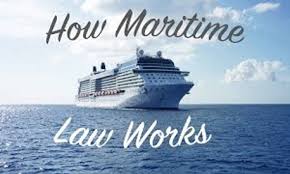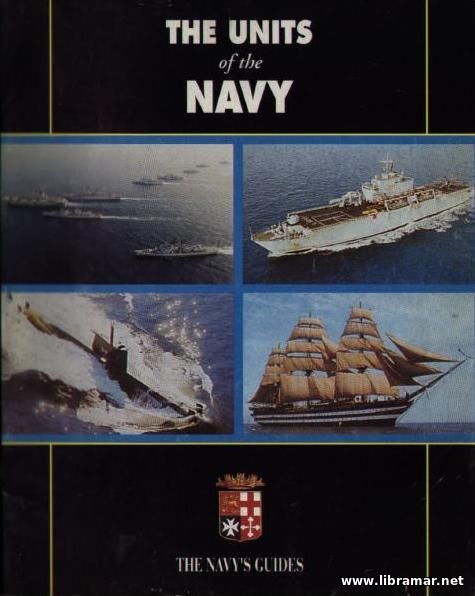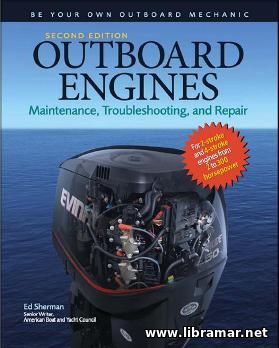How Maritime Law Works

All of us live in countries where there are laws and governing bodies telling us what we can and cannot do. However, 70% of the world is ocean, where there are no countries and, consequently, no governing bodies to tell people what is right and wrong. That is why maritime law exists.
Let us start with a hypothetical: a baby is born on a cruise ship sailing in the middle of the Atlantic Ocean. What nationality does he or she take? On the picture the coast of some fictional place in some fictional country governed by some fictional government is shown. From the white line, which is the water line at the lowest low tide, every country is allowed 12 miles of territorial waters. In the past, it used to be 3 miles – the distance a cannon could shoot off shore, but that has since changed.
Those twelve miles are the property of a country. They can do pretty much whatever they please in it and all domestic laws apply. Foreign ships are, however, sometimes allowed into these waters under the principle of innocent passage. If ships have innocent purpose – which does not include fishing, polluting, weapons practice or spying – they are allowed to pass through territorial waters of a foreign nation without permission as long as they do so quickly and without stopping on ashore.
purpose – which does not include fishing, polluting, weapons practice or spying – they are allowed to pass through territorial waters of a foreign nation without permission as long as they do so quickly and without stopping on ashore.
Beyond the territorial waters there is another 12 miles of contiguous zone, which allows country to enforce laws as long as they fall into one of four categories – if the laws have to do with customs, taxation, immigration, or pollution, they can be enforced in the contiguous zone.
Beyond the contiguous waters there is the Exclusive Economic Zone, also known as the EEZ and it extends 200 nm from shore. Beyond the territorial waters the EEZ is in international waters, however, only the country who holds the exclusive economic zone has the rights to harvest natural resources in this area. This law was originally set up to help with disputes over fishing rights but has since neem incredibly useful with the boom in oil drilling. All these laws do, however, occasionally cause disputes due to overlapping zones.
For example, the South China Sea is a critically important waterway - nearly 1/3 of the world’s shipping traffic passes through it and it reportedly has huge untapped oil reserves, and an area of traditional disputes, due to the countries in the region, having the land, also pretending on the water.
When two countries are less than 400 nm from each other, it is up to them to decide where their respective economic zones end. Most of the countries solve this civilly by separating the zones at the equidistant point from each of their shores; however, when the stakes are so high, such at the South China Sea, countries can be a bit less cordial.
So, returning to our cruise ship baby, let us change the hypothetical and say that the cruise ship was sailing in US territorial waters, i.e. less than 12 miles away from shore. Every oceangoing vessel is required to be registered in some country. Most large cruise ships are registered in tiny far-away countries.
 Panama, which is a relatively small country, holds the registration of one quarter of world’s ships because taxes and labor costs are low. When a ship is in international waters, the laws of the country of registration apply. A ship registered in Amsterdam could legally have prostitution and marijuana onboard, as long as they got rid of the drugs and shut down brothels before sailing into territorial waters of country, the onboard laws switch to that of the country the ship is physically in.
Panama, which is a relatively small country, holds the registration of one quarter of world’s ships because taxes and labor costs are low. When a ship is in international waters, the laws of the country of registration apply. A ship registered in Amsterdam could legally have prostitution and marijuana onboard, as long as they got rid of the drugs and shut down brothels before sailing into territorial waters of country, the onboard laws switch to that of the country the ship is physically in.
This is the same for nationality law – a baby born on a Dutch ship within 12 miles of the US is a baby born in America. Since US is one of the 30 countries that unconditionally grants citizenship to any baby born within the country, a baby born in US territorial waters is lucky enough to receive the world’s 8th most powerful passport.
There are two exceptions to this rule. Foreign diplomats visiting or living in the US with a diplomatic passport are not subject to the laws of the US or any other nation other than their own. Consequently, the babies of foreign diplomats do not automatically receive American citizenship. Additionally, the babies of individuals staging a hostile invasion or occupation of American are not granted American citizenship upon birth.
Here is where things get even more confusing. Even though a ship in international waters is an extension of the territory of the nation it is registered in law wise, the rules for nationality are different. The United Nations Treaty on the Reduction of Statelessness, which is followed by some countries, says that a baby born in international waters should just take the nationality of their parents.
Most of the world’s countries use the principle of bloodline to determine if a baby should get citizenship rather than whether or not a baby was born in the country. However, there are some countries that will not give citizenship to a baby born outside the country. In that case the baby would take the citizenship of the country in which the ship was registered.
There is a long history of exploiting maritime laws. During prohibition, US ships started to change their registration to Panama and other foreign countries so they could serve alcohol in international waters. In the mid-century, casino boats left from many cities where gambling was illegal to partake in legal gambling in international waters.
In 2005, entrepreneur Roger Green started SeaCode, a company that planned to evade US labor laws by placing an old cruise ships 12 miles off the shore of California. They would bring in foreign coders and house them in this ship where they would not have to abide by US wage laws or go through difficult visa application process. The idea never came to fruition but the technical legality of it just shows how convoluted maritime law is.
The "Read Later" function allows you to add material to this block with just one click. Just click on the icon and read the articles that interest you at any convenient time.


